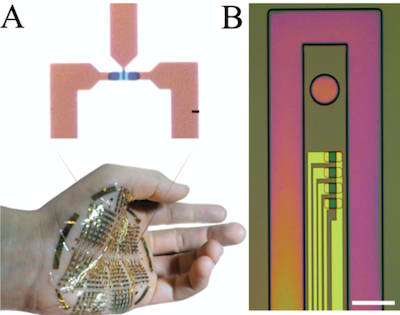
Researchers are working to use unique properties of materials to develop novel electronic devices that allow efficient interaction with biological substrates — specifically neural networks and the brain.
The bioelectronic devices are not only fast, sensitive, biocompatible, soft, and flexible, but also have long-term stability in physiological environments such as the human body.
The ion-driven soft transistors that can perform real-time neurologically relevant computation and a mixed-conducting particulate composite that allows creation of electronic components out of a single material.
The organic transistors record individual neurons and perform real-time computation that could facilitate diagnosis and monitoring of neurological disease. The soft, biocompatible smart composite enables the creation of complex electronic components which traditionally require several layers and materials.
For more information, visit here .



